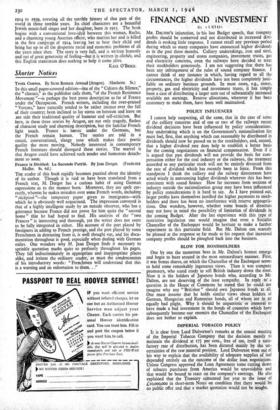FINANCE AND INVESTMENT
t US']0=,
MR. DALTON'S injunction, in .his last Budget speech, that Company profits should be conserved and not distributed in increased divi- dends is evoking little response. I cannot recall any previous period during which so many companies have announced higher dividends as in the past three months. Colliery undertakings, iron and steel, engineering, property and stores companies, investment trusts, gas and electricity concerns, even the railways have decided to treat their stockholders generously. I am not suggesting that there has been any infringement of the rules of sound company finance. I cannot think of any instance in which, having regard to all the circumstances, the higher dividends have not been completely justi- fiable on ordinary business grounds. In most cases, e.g., stores, property, gas and electricity and investment trusts, - it has simply been a case of distributing a larger sum out of substantially increased available net earnings. Reserve allocations, wherever it has been customary to make them, have been well maintained.
POLICY INFLUENCES I cannot help suspecting, all the same, that in the case of some of the colliery concerns and of one or two of the railways recent dividend decisions have been influenced by policy considerations. Any undertaking which is on the Government's nationalisation list must feel, first, that anything which can reasonably be distributed in dividends should now be passed on to the stockholders, and, second, that a higher dividend rate does help to establish a better basis for the coming negotiations on financial compensation. Even if it is argued that past dividends will not provide the basis for com- pensation either for the coal industry or the railways, the treatment accorded to any particular stock will not be entirely divorced from the rate of dividend which has recently been in force. From this standpoint I think the colliery and the railway directorates have acted wisely in announcing higher dividends wherever this has been consistent with sound finance How far increases from sections of industry outside the nationalisation group may have been influenced by policy considerations it is hard to say. As I have pointed out, larger profits have themselves justified the higher payments to stock- holders and there has been no interference with reserve appropria- tions. One wonders, however, whether some boards of directors may not have in mind the possibility of limitation of divid,ends in the coming Budget. After the last experience with this type of restrictive legislation one would imagine that even a Socialist Chancellor of the Exchequer would be hesitant to make a further experiment in this particular field. But Mr. Dalton can scarcely be pleased at the response so far made to his request that increased company profits should be ploughed back into the business.
BLOW FOR BONDHOLDERS
One by one the numerous bees in Mr. Dalton's bonnet emerge and begin to buzz around in the most extraordinary manner. First, it was bonus shares, on which the Chancellor of the Exchequer seems to hold some remarkably ingenuous views. Then it was company promoters, who stand ready to sell British industry down the river. Now it is the holders of Japanese bonds who, according to Mr. Dalton, are not deserving of the least sympathy. In reply to' a question in the House of Commons he stated that he could not imagine why any " Britisher " should own Japanese bonds •at- all. One must assume that he holds similar views about bOlders of German, Hungarian and Rumanian bonds, all of whom are in an equally bad plight. Why it should be unpatriotic or immoral to have made a bad investment in the bonds of countries which have subsequently become our enemies the Chancellor of the Exchequer does not bother to explain.
IMPERIAL TOBACCO POLICY
It is clear from Lord Dulverton's remarks at the annual meeting of the Imperial Tobacco Company that the decision merely to maintain the dividend at 17f per cent., free of tax itself a satis- factory rate of distFibution has been dictated mainly by the un- certainties of the raw material position. Lord Dulverton went out of his way to explain that the availability of adequate supplies of leaf depended entirely on the outcome of the dollar loan negotiations. Unless Congress approved the Loan Agreement some cutting down of tobacco purchases from America would be unavoidable and that would be bound to react on the company's earnings. He also explained that the Treasury consented last year to the issue of £50,000,000 in short-term Notes on condition that there would be no public offer and that a market quotation would not be sought.


























 Previous page
Previous page